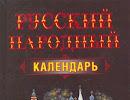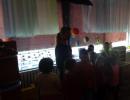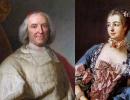No one will be at home parsnips. Analysis of the poem "No one will be in the house" (B. Pasternak). Size and rhyme
No one will be in the house
Except twilight. One
Winter day in a through opening
Not drawn curtains.
Only white wet clods
A quick glimpse of moss,
Only rooftops, snow, and apart from
Roofs and snow, no one.
And again draw frost,
And wrap me up again
last year's gloom
And the affairs of winter are different.
And again prick until now
Guilt not released
And the window on the cross
Squeeze wood hunger.
But suddenly on the curtain
Doubt will tremble, -
Silence with steps.
You, like the future, will enter.
You will appear from the door
In something white, without quirks,
In something, really from those matters,
From which flakes are sewn.
1931
Analysis of the poem "There will be no one in the house" by Pasternak (1)
The work of Boris Pasternak is incredibly difficult to understand. His works are always metaphorical through and through, contain a secret meaning. Without knowing the circumstances of the poet's personal life, it is not always possible to grasp this meaning. The poem "No one will be in the house ..." (1931) is directly related to an important event in the life of Pasternak. This year he broke off relations with his first wife and created a new family with Z. Neuhaus. This event caused a scandal and gave rise to a lot of rumors, since the woman also had a husband, who, in addition, was a friend of Pasternak.
The first part of the poem describes the loneliness of the poet. Probably, he has already left his first wife and is waiting for the arrival of his beloved. He has time to think about what happened. The loneliness of the lyrical hero is not violated by anyone. He dissolves into the environment. The specification "except" emphasizes his isolation from the human world. “Except for twilight”, “except for roofs and snow” - the presence of inanimate objects and phenomena only exacerbates the loneliness of the author.
The gloomy winter landscape sets up the lyrical hero for bleak memories. "Last year's gloom" is probably due to an unsuccessful family life. The author feels “unresolved guilt” behind him. Pasternak does not mention his first wife in any way. It can be assumed that it was he who caused the breakup of the family.
The appearance of the heroine completely transforms reality. It is preceded by "doubt trembling" even on the curtain. It becomes clear that the author was waiting for his beloved with great impatience, just carefully hiding it from the reader. He was in a timeless and spaceless state. This is emphasized by the comparison of the heroine with the "future". Probably, Pasternak was not completely sure that a woman would leave her husband for him. Therefore, he did not make any plans and did not indulge in dreams. The sudden appearance of a woman illuminated his whole life and awakened faith in a happy future.
The change in the mood of the lyrical hero conveys a change in his perception of reality. If at the beginning of the work snow is associated with "white wet clods", then in the finale an image of airy "flakes" appears. They symbolize the unearthly material from which the outfit of the main character is sewn.
The poem "No one will be in the house ..." reflects Pasternak's deeply personal feelings and experiences. It is a necessary element for understanding the life and work of the poet.

Analysis of Pasternak's poem "No one will be in the house ..." (2)
Most poets in their works strive to convey what they feel at the time of their writing. Therefore, it is not surprising that the recognized masters of the lyrics often have verses of a philosophical or political content, and poets with a clearly expressed civic position often write about love. Boris Pasternak is no exception in this regard, and his authorship includes poems on a wide variety of subjects.
The poet himself never considered himself a person who is able to gracefully convey feelings in words, and sincerely dreamed that he could someday learn this. However, it is precisely from the poems of Boris Pasternak that one can track the most significant events of his personal life. An example of such a work is the poem "There will be no one in the house ...", which the poet dedicated to his second wife Zinaida Neuhaus.
Roman Pasternak and Neuhaus was shrouded in gossip and speculation. However, it was no secret to anyone that the poet actually took his future wife away from his best friend. By that time, Pasternak already had a family, and Zinaida Neuhaus herself had been legally married for almost 10 years. However, this did not stop him from breaking off relations with his “halves”. The very beginning of this unusual novel is narrated by the poem "There will be no one in the house ...", created in 1931. It begins with the fact that the author, admiring the winter evening "in the through opening of the curtains not drawn," recalls how he destroyed his first family. The author experiences an acute sense of guilt, and “last year’s despondency and the deeds of another winter” finds on him when he broke up with his first wife, Evgenia Lurie. Pasternak doubts that he acted correctly and prudently. Indeed, on one side of the scales was a family and a child, and on the other - feelings that are far from always a guarantee of personal happiness. However, his doubts are dispelled by the one to whom he gave his heart. “Measuring the silence with steps, you, like the future, will enter,” this is how the poet describes the appearance of Zinaida Neuhaus not only in an apartment with frost-covered windows, but also in his life. Talking about the outfit of the chosen one, Pasternak notes that it is as white as the snow flakes outside the window, thereby emphasizing the purity of the feelings of this woman and the disinterestedness of her actions. The image of Zinaida Neuhaus is shrouded in a romantic halo, but at the same time the poet portrays her as an ordinary earthly person who knows how to love and give happiness to those who are destined for her by fate.
The poem "There will be no one in the house" was written in 1931. It was included in the collection "The Second Birth" published in 1932. This was the time when Pasternak met his future second wife, Zinaida Neuhaus, at that time the wife of Heinrich Neuhaus, the famous pianist and friend of Pasternak. For the union in marriage, which took place in 1932, Pasternak and Zinaida Neuhaus had to endure a difficult divorce from their former husband and wife. Pasternak left his son, and the children of the pianist Neuhaus lived in the family of Zinaida and Boris. The younger, Stanislav, also became a famous pianist.
Zinaida Neuhaus-Pasternak was the writer's wife until his death in 1960, but in fact after 1945 the couple began to move away from each other. Pasternak's last love was Olga Ivinskaya, for whom the poet did not dare to leave his second wife, as he had once left his first for her sake.
Literary direction and genre
The poem is an excellent example of love poetry. Pasternak is a bright representative of modernism of the 20th century, but after the revolution of the 17th century. he was not a member of any literary association, remaining an independent original poet.
Theme, main idea and composition
The theme of the poem is love, which changes life, gives the future. The main idea is connected with the amazing property of true love - to revive a person to a new life, give him the strength to survive the past, "despondency" and look into the future.
The poem consists of 6 stanzas. The first 4 stanzas describe the state of the lyrical hero, who succumbs to a gloomy winter mood, plunges into memories. In the last two stanzas, the mood of the lyrical hero changes with the arrival of his beloved. In some editions, the last two stanzas are even printed as eight lines.
The poem does not have a lyrical finale, the lyrical hero does not put any emotional point. The arrival of the beloved brightens up the loneliness of the hero, but the further development of events is not clear, the lyrical hero only has a glimmer of hope that the heroine is his future.
Paths and images
The main state and mood of the lyrical hero is loneliness. It is described with the help of the personification of twilight that fills the house and is not something a someone- a certain personality, evoking melancholy. Another person - an animated winter day - stands outside the windows, visible through the curtains that are not drawn. Undrawn curtains themselves are a sign of disorder in the house of the lyrical hero, the lack of comfort in his life.
The second stanza is contrasting in color. Black roofs and white snow, fast movement (neologism flash) white snowflakes that wave through the window encourage the hero to succumb to the state of nature and “spin”. This internal movement, which is given to the lyrical hero by feelings (last year's despondency), continues the spinning of snow and the dynamic outlines of frost on the windows.
The first two stanzas are completely static, there are no verbs in them. Movements in the poem are associated with snowfall and the intrusion of the guest.
The affairs of winter are different - obviously, the past love of the lyrical hero. He does not name the people who hurt him, with whom he was unable to negotiate earlier. The fourth stanza is a complex sentence, the first part of which is a one-part indefinitely personal, that is, the personality of those who pricks the fault that not forgiven, is not important and not interesting to the lyrical hero. Verb prick refers to the lyrical hero, who in this stanza, with the help of psychological parallelism, is compared with a window experiencing the pressure of “wood hunger” (metaphor). Verb squeeze refers already to the wooden beams of the window, which put pressure on the glass, but cannot break it.
The fourth stanza is the only one thrown out in the romance performed in the film "The Irony of Fate". Obviously, because of the complexity of listening and because of a hint of some guilt for the past, which Lukashin did not have.
The appearance of the beloved precedes shiver of invasion(metaphor). The curtain is the opposite of the curtain, it is dense and often hangs not on the window, but on the door. Obviously, this curtain is drawn, but it sways from the steps. The steps that appear in the next line measure and destroy the silence in which the lyrical hero has been all this time. The heroine is not only compared with the future, but is also the future of the lyrical hero.
The clothes of the beloved for the lyrical hero merge with the snow outside the window, which appears to the hero as material for the woman's white clothes. Such an unfinished ending, in which the silence in the room is broken by a guest bursting directly from the world of "roofs and snow", does not reveal the secrets of the future, but changes the hero's worldview
Size and rhyme
The poem is written in trochee with many pyrrhias, which makes the rhythm look like the uneven breathing of a lover. The rhyme in the poem is cross, female rhyme alternates with male.
- "Doctor Zhivago", an analysis of the novel by Pasternak
- "Winter Night" (Snow, snow all over the earth...), analysis of Pasternak's poem
No one will be in the house
Except twilight. One
Winter day in a through opening
Undrawn curtains.
Only white wet clods
A quick glimpse of moss,
Only rooftops, snow, and apart from
Roofs and snow, no one.
And again draw frost,
And wrap me up again
last year's gloom
And the affairs of winter are different.
And again prick until now
Unresolved guilt
And the window on the cross
Squeeze wood hunger.
But suddenly on the curtain
Doubt will tremble, -
Silence with steps.
You, like the future, will enter.
You will appear from the door
In something white, without quirks,
In something, really from those matters,
From which flakes are sewn.
(No Ratings Yet)
More poems:
- I'm not ashamed of anyone or anything - I'm alone, hopelessly alone, Why should I bashfully lock myself into the silence of midnight valleys? Heaven and earth - it's me, Incomprehensible and alien ...
- What's the forecast for today, honey? What did you wake up with again? Tell me simply: “Lord have mercy! What nonsense do you mean?" The most important thing is the weather in the house, ...
- There is no one in the world more desirable than this ugly Cinderella of ours, Elka. I would take and eat freckled raisins from an elkin's neck. Where is her home? For the ford. What does she smell like? Honey,...
- There is no one around, no matter how you breathe. Let's arrange a meeting with you! Marina, you write me a letter - I will answer you by phone. Let it be like two years ago, Let ...
- Don't dare to see anyone Cover your eyes with glass and flowers Pushing back the rays of the waterfall And beautiful flags With a blank white page of paper On a black face Be like a golden watch Where...
- No one will save anyone. And everyone, like a wolf, is doomed. Neither grandmother's witchcraft, nor great fidelity of wives will give anything, nothing. The apple fruit explodes like a toy of papers and ink. Grasping from all...
- What in life, if we do not love anyone, When no one can love us in return, When in the past we do not see anything And in the future, nothing in our hearts ...
- Why, not loving anyone, do you care so passionately about yourself? Do you want to be loved? My dear, you want too much! Do you want to be loved? For what? Isn't it because the word...
- The name will not always be the same - They will give me another later. Fuller, stronger, stricter My path is drawn in it. It will be in your hand like a lamp. I will see where the darkness is...
- The night is bitter in a solitary house. At this hour - which has subsided for a long time - Memory cries. And again in languor I drink memories like wine. There, beyond the city wastelands, Beyond the boulevard in the street...
- ... And again In one of the clearings Between cheerful strong oaks - Half-rotten logs of dugouts And knees of swollen trenches. Even helmets, boots, windings Time could not turn to dust... Ah, my soldiers...
- The solar circle, the sky around - This is a drawing of a boy. He drew on a piece of paper And signed in the corner: May there always be sun, May there always be sky, May there always be mother, May there always...
- Where are you taking me, what are you singing - autumn, sleepless, scattered rain? Tearing off the inanimate foliage from the branches, why am I following you in reality? There is no one on the street ... Only the darkness is silent ...
- I said to myself: stop writing, - But the hands themselves ask. Oh, my dear mother, my beloved friends! I’m lying in the ward - they squint, I don’t sleep: I’m afraid they will attack, - After all, next to me - ...
- There was one day when they were Not a prostitute, not a slave, But they were all human From the soul, a resurrected shrine. There was only one day of Easter in the year And the night of Christ's Resurrection, When he looked at ...
"No one will be in the house..." Boris Pasternak
No one will be in the house
Except twilight. One
Winter day in a through hole
Undrawn curtains.Only white wet clods
A quick glimpse of moss,
Only rooftops, snow, and apart from
Roofs and snow, no one.And again draw frost,
And wrap me up again
last year's gloom
And the affairs of winter are different.And again prick until now
Unresolved guilt
And the window on the cross
Squeeze wood hunger.But suddenly on the curtain
Doubt will tremble, -
Silence with steps.
You, like the future, will enter.You will appear from the door
In something white, without quirks,
In something, really from those matters,
From which flakes are sewn.
Analysis of Pasternak's poem "No one will be in the house ..."
Most poets in their works strive to convey what they feel at the time of their writing. Therefore, it is not surprising that the recognized masters of the lyrics often have verses of a philosophical or political content, and poets with a clearly expressed civic position often write about love. Boris Pasternak is no exception in this regard, and his authorship includes poems on a wide variety of subjects.
The poet himself never considered himself a person who is able to gracefully convey feelings in words, and sincerely dreamed that he could someday learn this. However, it is precisely from the poems of Boris Pasternak that one can track the most significant events of his personal life. An example of such a work is the poem "There will be no one in the house ...", which the poet dedicated to his second wife Zinaida Neuhaus.
Roman Pasternak and Neuhaus was shrouded in gossip and speculation. However, it was no secret to anyone that the poet actually took his future wife away from his best friend. By that time, Pasternak already had a family, and Zinaida Neuhaus herself had been legally married for almost 10 years. However, this did not stop him from breaking off relations with his “halves”. The very beginning of this unusual novel is narrated by the poem "There will be no one in the house ...", created in 1931. It begins with the fact that the author, admiring the winter evening "in the through opening of the curtains not drawn," recalls how he destroyed his first family. The author experiences an acute sense of guilt, and finds "last year's despondency and the deeds of another winter" on him. when he broke up with his first wife Evgenia Lurie. Pasternak doubts that he acted correctly and prudently. Indeed, on one side of the scales was a family and a child, and on the other - feelings that are far from always a guarantee of personal happiness. However, his doubts are dispelled by the one to whom he gave his heart. “Measuring the silence with steps, you, like the future, will enter,” this is how the poet describes the appearance of Zinaida Neuhaus not only in an apartment with frost-covered windows, but also in his life. Talking about the outfit of the chosen one, Pasternak notes that it is as white as the snow flakes outside the window, thereby emphasizing the purity of the feelings of this woman and the disinterestedness of her actions. The image of Zinaida Neuhaus is shrouded in a romantic halo, but at the same time the poet portrays her as an ordinary earthly person who knows how to love and give happiness to those who are destined for her by fate.
No one will be in the house
Except twilight. One
Winter day in a through opening
Undrawn curtains.
Only white wet clods
Fast flywheel,
Only rooftops, snow, and apart from
Roofs and snow, no one.
And again draw frost,
And wrap me up again
last year's gloom
And the affairs of winter are different.
And again prick until now
Guilt not released
And the window on the cross
Squeeze wood hunger.
But suddenly on the curtain
The intrusion will tremble, -
Silence with steps.
You, like the future, will enter.
You will appear from the door
In something white, without quirks,
In something, really from those matters,
From which flakes are sewn.
Analysis of the poem "No one will be in the house" by Pasternak
Creativity B. Pasternak is incredibly difficult to understand. His works are always metaphorical through and through, contain a secret meaning. Without knowing the circumstances of the poet's personal life, it is not always possible to grasp this meaning. The poem "No one will be in the house ..." (1931) is directly related to an important event in the life of Pasternak. This year he broke off relations with his first wife and created a new family with Z. Neuhaus. This event caused a scandal and gave rise to a lot of rumors, since the woman also had a husband, who, in addition, was a friend of Pasternak.
The first part of the poem describes the loneliness of the poet. Probably, he has already left his first wife and is waiting for the arrival of his beloved. He has time to think about what happened. The loneliness of the lyrical hero is not violated by anyone. He dissolves into the environment. The specification "except" emphasizes his isolation from the human world. “Except for twilight”, “except for roofs and snow” – the presence of inanimate objects and phenomena only exacerbates the loneliness of the author.
The gloomy winter landscape sets up the lyrical hero for bleak memories. "Last year's gloom" is probably due to an unsuccessful family life. The author feels “unresolved guilt” behind him. Pasternak does not mention his first wife in any way. It can be assumed that it was he who caused the breakup of the family.
The appearance of the heroine completely transforms reality. It becomes clear that the author was waiting for his beloved with great impatience, just carefully hiding it from the reader. He was in a timeless and spaceless state. This is emphasized by the comparison of the heroine with the "future". Probably, Pasternak was not completely sure that a woman would leave her husband for him. Therefore, he did not make any plans and did not indulge in dreams. The sudden appearance of a woman illuminated his whole life and awakened faith in a happy future.
The change in the mood of the lyrical hero conveys a change in his perception of reality. If at the beginning of the work snow is associated with "white wet clods", then in the finale an image of airy "flakes" appears. They symbolize the unearthly material from which the outfit of the main character is sewn.
The poem "No one will be in the house ..." reflects Pasternak's deeply personal feelings and experiences. It is a necessary element for understanding the life and work of the poet.






